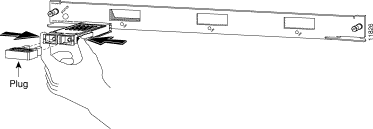Hot-swappable GBIC
modules provide easy selection or change of interfaces on a port-by-port basis. For
example, Gigabit Ethernet uplinks within a building might make use of 1000BASE-SX over
multimode fiber for distances up to several hundred meters, but backbone connections
between buildings might require using 1000BASE-LX/LH over single-mode fiber in cable runs
up to ten kilometers. When even greater distance runs are required, Cisco also offers the
extended reach 1000BASE-ZX over single-mode fiber for distances up to one hundred
kilometers. The GBIC-enabled Gigabit Ethernet interfaces can be configured with
either 1000BASE-SX, 1000BASE-LX/LH or 1000BASE-ZX, depending on the application. By making
use of
industry-standard hot-swappable GigaBit Interface Converter (GBIC) modular technology,
other Cisco Gigabit Ethernet interfaces can intermix any combination of 802.3z-compliant
1000BASE-SX, 1000BASE-LX/LH or 1000BASE-ZX interfaces on a port-by-port basis. The
benefits to the customer include:
- Allow port-by-port selection of physical interface, which gives the flexibility of having singlemode and multimode cables on different ports of the same line card
- Investment protection for standards changes or future developments (for example, 10-km lasers currently beyond the standard)
Are GBICs an Industry Standard?
While the concept of the GBIC is common throughout the networking industry, there are no interoperability standards for GBICs. Therefore, Cisco GBICs work only with Cisco products and likewise, Cisco products only support Cisco GBICs.
What are the Part Numbers?
The 1000BASE-SX ( Short wavelength laser) GBIC part number is WS-G5484.
The 1000BASE-LX/LH (Long Wavelength / Long haul laser) GBIC part number is WS-G5486.
The 1000BASE-ZX (Extended Reach laser) GBIC part number is WS-G5487.
What do GBICs look like?


What type of cables plug into GBICs?
GBICs accept singlemode or multimode fiber-optic cables with SC connectors.
What is a mode conditioning cable and when is it needed?
In short, you need a mode conditioning cable (CAB-GELX-625) when using a LX/LH GBIC to connect to a multimode fiber that is longer than 300 meters. When an unconditioned laser source designed for operation on single-mode optical fiber is directly coupled to a multimode optical fiber cable, an effect known as differential mode delay (DMD) might result in a degradation of the modal bandwidth of the optical fiber cable. This degradation results in a decrease in the link span (the distance between a transmitter and receiver) that can be supported reliably. The effect of DMD can be overcome by conditioning the launch characteristics of a laser source. A practical means of performing this conditioning is to use a device called a mode conditioning patch cord. To prevent data transmission problems, you must use a mode conditioning patch cord whenever you connect 1000BASE-LX (1300-nm) or Long-Haul GE interfaces via 50/125-µ or 62.5/125-µ multimode optical fiber at distances greater than 984.25 feet (300 meters).
Where is there more information on GBICs?
Right here!
